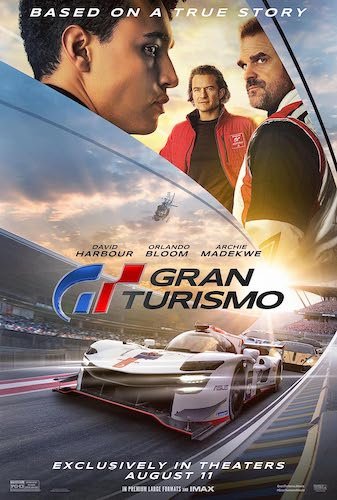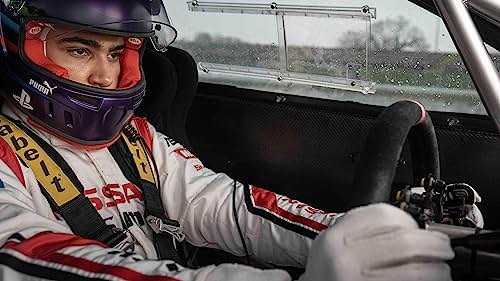Gran Turismo
Written by Andreas Babiolakis
We all had such high hopes for Neill Blomkamp, especially me. As a South African myself (born there, raised in Toronto, Canada), I always had expectations for the director who had a similar life path to me (he’s a Vancouverite, mind you). District 9 is a stellar science fiction film that represents classism, colonialism, and other sociological discussions through a part-mockumentary, alien lens. Elysium was a so-so follow-up, but Chappie was an outright disaster that was so infuriating that I didn’t even bother with Demonic. What happened to this up-and-comer sci-fi auteur? Was he just a one-hit wonder? Well, he’s back now, this time with his first non-science-fiction release, although it almost feels like it fits in perfectly with his other films. Gran Turismo is based on the classic PlayStation video game series but also on real-life events (for those that don’t know, Gran Turismo is a racing game that was known for its groundbreaking graphics with each subsequent release, and the physics and customizability of the racing experience). The real-life elements are about Jann Mardenborough: a fan of the series who heightened his gameplay through at-home customization (steering wheel, pedals, the whole deal) and was actually great enough to be able to take his talents to the real racetrack. He was able to translate the video game (sorry… “simulator”) to reality.
Mardenborough won a competition after being hand selected for his Gran Turismo record-breaking times; the contest, sponsored by Nissan (unlike me), allowed him to try out professional race car driving for real. Blomkamp’s film seemingly breaks whatever record Mardenborough would have set for how quickly it places itself on the track because it glosses over as much of the original story as possible. Unfortunately, this is a real-life event disguised as a video game adaptation because Gran Turismo is far more interested in replicating the rush one feels while playing the game than it is on the mind-boggling story that allows this film to even exist. So much of the film is about the racing itself and Mardenborough’s capabilities on the track than it is about actually getting us there. Why is he fascinated by racecar driving? How did he fine-tune his skills? What was the adjustment between the video game and actual racecar driving? We never really get any of that exposure. Instead, Gran Turismo makes each and every race a thrill to watch, but a film needs to be more than its highlight reel. We can catch these online after a film has been released. It’s supposed to be about the whole adventure: to tell a proper, full story. Gran Turismo feels like a speedrunner that zips through all of the menus and cutscenes just so we can get to playing. People watch speedrunners for other reasons: not for story or substance. If I want to revisit a nostalgic game in a very short amount of time or see someone break a world record, I will watch a speedrunner. I’m not watching Gran Turismo for either of those reasons.
Gran Turismo sacrifices too much story to feel fulfilling, but its racecar sequences are at least quite fun.
Where Gran Turismo saves itself from complete burnout is in its third act. Admittedly a lot of the film feels inauthentic and heightened to make this a more interesting cinematic experience (since, you know, the film wasn’t focusing more on the origins of the real-life story), so I had to look up if the pivotal moment two thirds into the film was accurate (I won’t heavily spoil what it is in case you aren’t aware of what went down). It turns out this event happened, but even then important details are muted quite a bit (including those that got hurt outside of what we see). Even still, as important as this sequence is (because the climax builds upon it), it never is about Mardenborough being a video gamer that managed to qualify as a professional driver. No. It’s just about the driving itself. Why does Gran Turismo ever settle for just being a racing flick instead of what it could have been (a discussion on his qualifications, how detailed video gaming culture has become, and so many other hypotheticals)? Outside of being a technical exercise that passes with flying colours (this film sounds, looks, and feels pretty meticulous in this way), Gran Turismo is completely flat as a story when it easily could have at least been interesting (it sadly isn’t).
Instead, the film is burdened by typical jokes for teens, some juvenile dialogue, and the low-hanging fruit of the cultural discrepancies between Boomers and Gen Z kids (even though Mardenborough would be a millennial given his age and when these events took place). The Gran Turismo video games always pushed the bar at least in a technical sense. The film doesn’t do quite that despite where it excels, but it also doesn’t do any legwork at all when it comes to making this film actually stand out; at least the video games always did so amongst their peers. With this consecutive dud of a film, I cannot help but wonder how District 9 worked and all of these others do not. Can I still blame those idiots in Die Antwoord for their manipulations that brick-walled Chappie? With Gran Turismo, I do not see a daring filmmaker that wanted to do more with an existing video game property or a fantastic true story. I see someone settling for typical tropes, lazy humour, and the bare minimum. The question doesn’t seem to be “Why can’t Blomkamp make District 9 again?” anymore, as much as it is “How did Blomkamp make District 9 in the first place?”, because that hunger he once had is long gone. Outside of the moments where Gran Turismo is made to feel like a video game experience (again, solely the racing sequences: the only things this film does right), Blomkamp doesn’t feel actually in control of this film at all; it’s as if his controller is left idle while he does something else. We don’t feel involved either, and that doesn’t help matters either. At this rate, while Gran Turismo isn’t exactly a God-awful film, it’s weak enough and with the wrong priorities you’re better off just playing any of the video games in the series. And, with that, I must ask one more question about a film based on an unbelievable real person and his story: “Why make this Gran Turismo film at all?”
Okay, one final thing: Jann Mardenborough serving as a stunt double for Archie Madekwe (the actor who plays him) is pretty badass, and that lessens how sour I feel about this film just a little bit.
Andreas Babiolakis has a Masters degree in Film and Photography Preservation and Collections Management from Toronto Metropolitan University, as well as a Bachelors degree in Cinema Studies from York University. His favourite times of year are the Criterion Collection flash sales and the annual Toronto International Film Festival.






